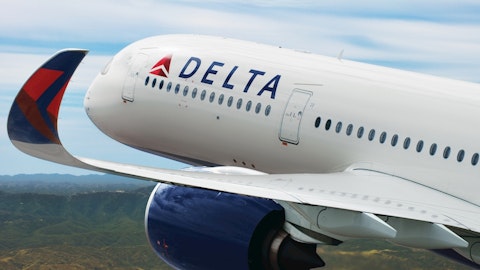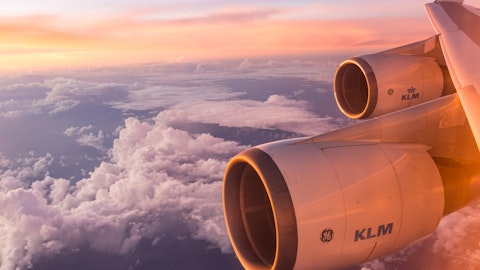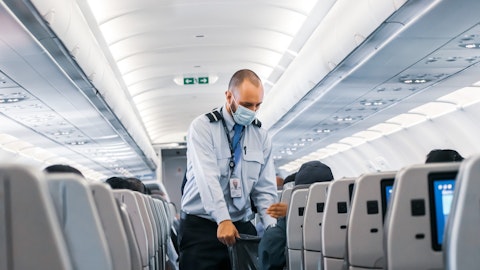Tracey McCann: It’s pretty much the same as last year. We’ll probably see between route charges and ATC, which can pretty much out of our control, is probably close to the overall passenger.
Michael O’Leary: Okay. Now what’s that in percentage terms roughly? High-single digit…
Tracey McCann: We have to care for some of it goes into route chart, some of it goes into airport charges, the ATC forecast will do their port charges.
Michael O’Leary: Okay. Thank you for that.
Sathish Sivakumar: Yeah. Thank you, Michael.
Michael O’Leary: Thanks, Sathish. Next question, please.
Operator: Thank you. That’s from Conor Dwyer at Morgan Stanley. Please go ahead.
Conor Dwyer: Thanks, guys. You might will be slow to talk about this yet, but on shareholder returns, are you still kind of talking about maybe splitting that between dividends and buybacks in terms of size, should we use what you guys used to do in terms of relative to free cash flow going forward? And in terms of timing, when you do get that net debt back down to zero, should we kind of be modeling that to be starting pretty much immediately after that? And then also back on the fleet delivery. So you noted you were talking to Boeing again. And I’d just like to hear what are the material benefits that you having in MAX 10, are the part suitably with MAX 8 still significant? And would you consider an Airbus order or to your points, if there’s pilot pinching in Europe as a result of the Airbus? Would that keep you away from that going that way? Cheers.
Michael O’Leary: Thanks, Conor. Welcome to the call. Good to see Morgan Stanley back covering both of the sector again. Shareholder returns. Look, we have huge draws on cash this year. We have a bond repaying of EUR850 million in March. There’s a EUR750 million in August, and we have subject to Boeing deliveries, we think next year, we’re probably about EUR2.3 billion, EUR2.4 billion in CapEx. So I don’t foresee any shareholder returns this year. But we do expect with reasonable trading this year to get to zero net debt by the end of this fiscal year. So we’re at zero net debt by March 2024. I think we will be looking at some shareholder returns at that time. I think shareholders who did put their hands in their pockets unlike kind of Heathrow shareholders, Ryanair shareholders, we had raised EUR400 million from shareholders during COVID that was critical to what raising additional bond financing, getting through COVID without any kind of state aid unlike our competitors.
And I think we’re committed firstly, to restoring the pay and agreeing pay increase with our people. Secondly, to keeping fares low for our customers. But then once all that’s done and we can see a way clear to having a zero net debt position again on the balance sheet, then we will return to shareholder returns. But it will be — we’re looking at probably the spring of 2024 before we start to consider that. I think in future shareholder returns, we’ll be more modest. I don’t think we’ll do big buyback. I think we’re looking at modest dividends on, hopefully, on an annualized basis. If earnings and cash flows allow, I think, the one thing going forward is that we will have a — no matter what happens, even if we do another order with Boeing, the rate of CapEx going forward will be smaller because the amount of aircraft, the net fleet additions will be smaller going forward in a period from FY ’27 onwards.
I expect us to be growing at kind of 4% or 5% a year, not 10% a year. And hopefully, that will allow us to have a more consistent dividend stream for our shareholders. Also, we’re in a rising interest rate environment, I think shareholders will welcome and appreciate a dividend stream from Ryanair, but I don’t see us doing large share buybacks in the future. They’ve proven difficult in the past. And to make them effective, I think the much better way of returning some — giving our shareholders some reasonable return would be modest dividend stream going forward. Fleet deliveries going forward. Look, again, I think I’ve dealt with the Boeing side of the house we look at an air force order, yes, we would, again, like I’ve always been entirely opportunistic when it comes to aircraft.
We would buy whichever aircraft is cheaper Airbus though have a much longer order book than Boeing. Boeing have obviously been disrupted by the grounding of the MAX for a number of years. Airbus have capitalized on that and the fact that due to the trade war between the Americans and the Chinese, Airbus is a beneficiary of Chinese aircraft orders at the moment. The Boeing order book is much weaker. Boeing does need to, I think, signed up a number of — get some orders in the books for the next couple of years. So it’s unlikely. I mean, everything we see at the moment is Airbus are pricing not materially. That’s good for us and that most of our competitors in Europe are Airbus operators and paying much higher prices for aircraft than we are for our Boeing orders at the moment.
But again, looking at the kind of the second hand or the leasing opportunities, we jumped on the opportunity there to extend ’24, the louder leases from 2024 to 2028 because they were fee to do so. I couldn’t care less whether we operate a Boeing or an Airbus aircraft, if there’s a material cost advantage per seat, then we would order that aircraft. I don’t believe that there would be — would that decision be affected by some pilot plant within the Airbus fleet around Europe. Honestly, Europe, and I think I’ve been saying this for a number of years, the capacity growth in Europe is stabilizing over the next number of years. You don’t have a lot of new entrees, there is no new entrants. There’s no interest cost of financing arising — there will be no startup low-fare carriers because I think Ryanair is the barrier to entry in most European airports.
Consolidation, I think you see Lufthansa eyeing up ITA. I think IAG will do a deal with TAP before the year is out. And then I do believe that EasyJet and Weeze, we get marked up as well. And I think you’re looking at a much more mature market for air travel in Europe in the next four or five years, where not unlike North America for the last 10 years, it’s been reasonably stable capacity and a bit more pricing or upward pressure on pricing within that marketplace. Europe has been the beneficiary of 20 years of deregulation, very low-cost airfares. I mean the airfares across Europe, thanks to Ryanair, are generally significantly cheaper than trading fares from the airports into the city centers. But I think that we’re coming to the end of that kind of mad cap capacity expansion and therefore, a much more sensible industry outlook in Europe for the next number of years.
But in that, I don’t think it makes much difference whether it’s Airbus or Boeing. There won’t be a shortage of pilots around Europe for the next five, 10 years. And certainly, if you look at the kind of growth in trading we’ve seen in our cadet programs over the last couple of years, there is no shortage of people willing to sign up to become pilots, recognize that it’s a very well-paid job. They do — they are highly skilled, but they’re certainly not overworked with the kind of restrictions of 900 flight hours a year. It’s still an average of 18 hours a week. They’re well trained. They’re well paid, and we’re very proud of the pilots, the crews we have in Ryanair. Next question, please. Thanks, Conor.
Conor Dwyer: Sure.
Operator: That’s from Mark Simpson at Goodbody. Please go ahead.




